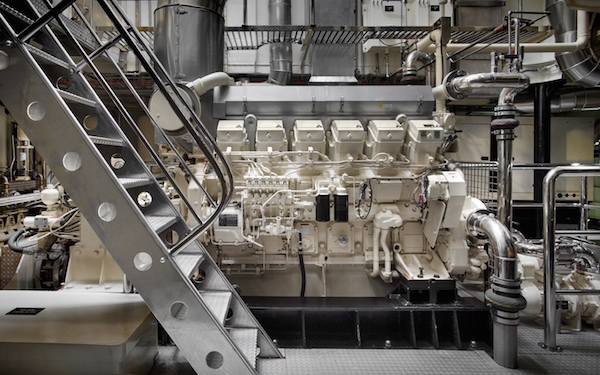Tackling the engineer shortage
We speak to Falmouth Marine School's Emma Baggett about the engineering cadetship that's in the pipeline…
Having spent 10 years developing the UKSA’s deck cadetship, former Cadetship Manager Emma Baggett is working on her next venture with Falmouth Marine School to develop a similar scheme for engineers. The idea first came about four years ago after she was approached by two prominent management companies that both expressed the need for more skilled engineers in the superyacht industry.
The three-year cadetship, which will be delivered from autumn 2019, will mirror the programmes found in the merchant navy and aim to provide a new engineering pathway into the maritime industry. As well providing students with a marine engineering degree and MCA and RYA qualifications alongside mentoring and support, the scheme will be centred around the broader engineering qualification introduced by MIN 524 – the new Small Vessel engineer route allows engineers to cross over between maritime sectors – which Baggett finds particularly exciting.
“For me, this is the future of training,” she explains. “So many crew start in yachting and then find themselves frustrated to have all the skills but unable to transfer between other sectors. Having training and certification amalgamated across a number of sectors means that the skills are transferable. This will benefit the whole maritime community with a pool of professional, well-trained and experienced engineers who are more likely to stay with their careers if they can achieve flexibility in their working lives.”
This interchangeable aspect of the cadetship has also gained the support of leading UK maritime charities, and will hopefully enable the opportunity for some candidates to secure funding for the scheme when the time comes.
The engineering cadetship will essentially follow along the same lines as the UKSA’s Professional Yacht Cadetship, but will require more workshop time (as dictated by the engineering tickets). The cadets, however, will still experience phases employed in the industry as part of the programme. This experience will help to solve the catch-22 situation that engineers entering the industry often find themselves in: they can’t find employment on board without the Marine Engine Operator License (MEOL), yet they can’t apply for a MEOL without the required sea time.
Alongside the opportunity to develop a new training route comes the need to ensure that the training meets the very broad range of skills required of today’s superyacht engineers. “With this year’s launch of a fully hybrid vessel, MY Home, it is also essential that the training is future proofed to be providing relevant skills,” adds Baggett. “By directly asking captains, engineers and crew agents through an online survey what the key skills over and above standard training really are, Falmouth Marine School is hoping to develop the perfect blend of skills.”
While the new cadetship, as well as the other deck cadetships that are currently available in the industry, may seem like an excellent way of bringing professionally trained and dedicated crewmembers into the superyacht industry, Baggett admits that the hardest thing about setting up these schemes is getting the industry to support them.
“People tend to have a very cynical view of training providers and initially many thought the introduction of cadetships were produced as just another expensive course to make money, but right from the start the intention was and still is, to increase the number of candidates with long-term career prospects by providing relevant training and support,” she explains. “As with anything new, it took a while for the industry to take us seriously, but once they experienced the professionalism of the cadets the captains and crew agents actively supported the concept and continue to do so, and employment opportunities are no longer an issue.”
Well known for its specialism in marine engineering, boat building, adventure sports and marine sciences, Falmouth Marine School has a range of developments planned over the coming years (as part of its Marine-i Project) and is particularly looking at expanding its range of training to encourage young people into careers at sea. As well as working on the upcoming engineering cadetship, they are also looking at introducing an academic maritime qualification for 16-to-18 year olds, aimed at teenagers who know they want a career in the maritime industry and want to use this time usefully.
“Such a qualification would help candidates get a head start in the industry and gain experience and qualifications relevant towards their future maritime career, instead of having to tread water for two years after completing their GCSEs by doing more conventional academic courses,” Baggett concludes. “It is vital that there are a number of routes to entry in all areas of the industry. Not everyone is looking for a long-term career, or wishes to follow a degree route, however for those serious about a long-term commitment, the cadetship route provides individuals with the training and support to achieve their aspirations within an extraordinary industry.”
Profile links
NEW: Sign up for SuperyachtNewsweek!
Get the latest weekly news, in-depth reports, intelligence, and strategic insights, delivered directly from The Superyacht Group's editors and market analysts.
Stay at the forefront of the superyacht industry with SuperyachtNewsweek
Click here to become part of The Superyacht Group community, and join us in our mission to make this industry accessible to all, and prosperous for the long-term. We are offering access to the superyacht industry’s most comprehensive and longstanding archive of business-critical information, as well as a comprehensive, real-time superyacht fleet database, for just £10 per month, because we are One Industry with One Mission. Sign up here.
NEW: Sign up for
SuperyachtNewsweek!
Get the latest weekly news, in-depth reports, intelligence, and strategic insights, delivered directly from The Superyacht Group's editors and market analysts.
Stay at the forefront of the superyacht industry with SuperyachtNewsweek




